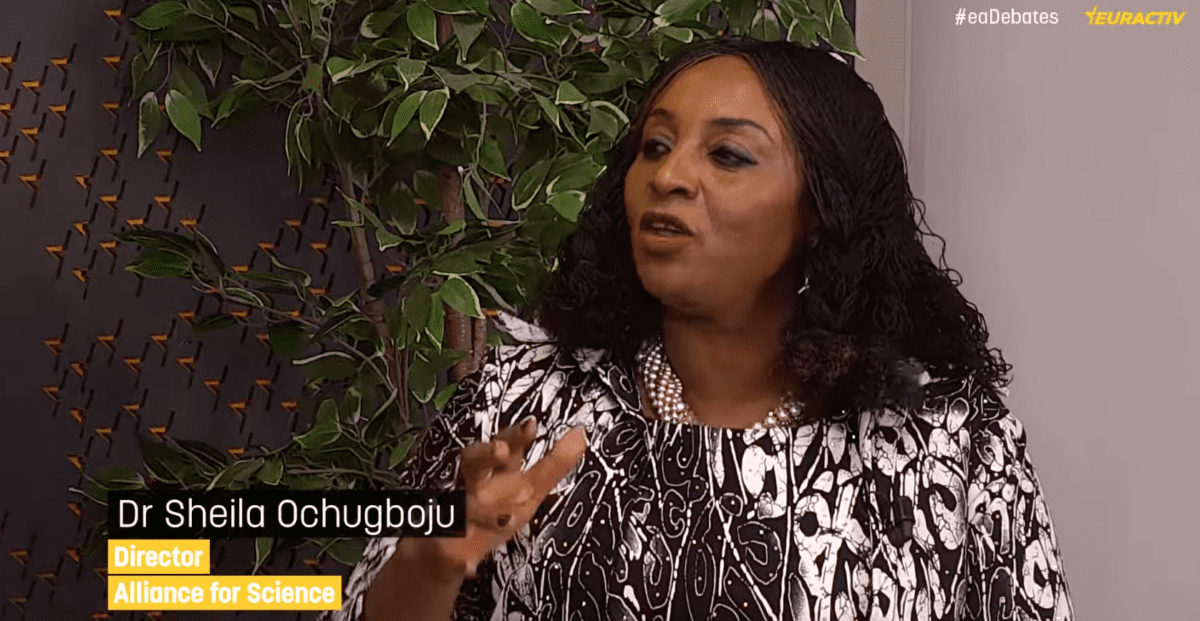At a Euractiv media event to mark the launch of the Breakthrough Institute/Alliance for Science’s new report on ‘new genomic techniques,’ stakeholders representing farmers, seed producers, and policymakers welcomed the more science-based approach proposed by the European Commission.
Speaking at the event were Klaus Berend, Director, Food Safety, Sustainability and Innovation directorate of the European Commission’s DG SANTE; Garlich von Essen, Secretary-General of Euroseeds, representing seed producers in Europe; Thor Gunnar Kofoed, an organic farmer and chair of the seed working group of the European farmers association COPA-COGECA; and Dr Sheila Ochugboju, Director of the Alliance for Science.
Divide gene-edited plants into two categories
The report, entitled The €3 Trillion Cost of Saying No: How the EU Risks Falling Behind in the Bio-economy Revolution, examines how outdated EU laws, especially a 2001 regulatory framework that currently classifies gene-edited crops as genetically modified organisms (GMOs), are choking off new sources of economic growth, employment, and environmental sustainability in Europe and beyond.
All the speakers were united that the European Commission’s new proposals — outlined by Klaus Berend — were an important step. Berend explained that the EC proposed dividing gene-edited plants into two categories according to whether their genetic changes could have happened in nature. While the first category would be regulated like conventionally bred new varieties, the second category would still fall under the GMO rule, making them unlikely to be adopted in Europe. Both categories would be labeled and not permitted under organic systems.

Commenting on the European Commission’s proposal for regulating NGTs, Garlich von Essen said: “It’s not a giant leap. It’s a very cautious first step.” However, he emphasized that the proposal contained provisions to “update with scientific progress,” which could be crucial. He contrasted this with the 2001 GMO rules, which is “a very old piece of legislation, but we’re stuck with it.”
He added: “There is a broad scientific consensus worldwide that these technologies are not dangerous” and have no additional risk specific to the crop breeding technique: “A wheat will still be a wheat, and a tomato will still be a tomato.” He acknowledged that the “discussion we are having today in Europe around these technologies is much more measured than what we saw 25 years ago on GMOs. Those that continued to oppose NGTs were ‘a rather small fringe group,'” he said.
Reduce pesticide use without sacrificing productivity
Speaking on behalf of European farmers, Thor Gunnar Kofoed said the challenge now was to reduce pesticide use without sacrificing productivity. “That’s why when you travel around Europe and meet farmers, they ask for these new varieties that they don’t need to spray so much. They say: ‘Can we get these new varieties?’, ‘When are they coming?'” He also said that as an organic farmer himself, and in conversation with other organic producers, “they all want to use NGTs” because they know that being excluded from new varieties used by conventional farmers will make them increasingly uncompetitive.
Dr Sheila Ochugboju, the Alliance for Science director, said: “There’s a global trend — this is a fourth industrial revolution, all these things are coming together, and we’re on the cusp of that. Europe is the world’s regulator, which greatly affects what’s grown in Africa and what choices African farmers and governments make in agricultural policy. We have to stop using so much pesticide.” She pointed out that pesticide use was often worse in Africa because farmers did not have protective gear, and more toxic products banned in Europe were still used.
“Farmers don’t use pesticides for fun”
Dr Ochugboju added that many African policymakers and anti-GMO activists point to Europe’s aversion to genetically improved crops as a reason to block adoption in Africa. “But Europe has a first-world privilege of being able to find alternatives,” like mechanization or even robotics, and is food secure. “But in the Global South, you have countries that are not food secure like Kenya where droughts and other climatic stresses are devastating maize crops alongside diseases and pest infestations.”
Speaking for European seed producers, Garlich von Essen agreed that ‘new genomic techniques’ are “the next big thing in plant breeding worldwide… that allow us to achieve breeding objectives faster” because of more precision and better understanding of working with plant genetics. He warned that if EU legislation on seed breeding continued to be more restrictive than in other parts of the world, investment would go elsewhere. “Brains and genes are mobile, so we go where we find the best conditions,” he said.
Farmers seeing decreasing productivity and incomes
Thor Gunnar Kofoed reminded the audience: “Farmers don’t use pesticides for fun. They use it to produce more and better quality products.” To keep farming profitable while reducing chemicals, however, “we need some other tools to use instead of these pesticides” – notably, better crop genetics. “If I look at the future for farmers, the only way is to have better seed.”
Dr Ochugboju noted the urgency of the current situation. “NGTs give us hope for the future,” she stressed. “We in the Alliance for Science who are fighting a science communications war against misinformation” struggle to counter perceptions of an anti-science stance in Europe, which has a “big loud voice in the global conversation. So Europe as the global regulator has to look at the impact of that regulation” on the Global South, she emphasized, in particular “would it impede future technological advances there too.”
She concluded: “Climate change is here. We need more options; we have a world to feed that is getting bigger and hungrier. Our farmers are seeing decreasing productivity and incomes. We need something new.”
_______________________________________________________________________________________________
Mark Lynas is a climate change author and campaigner. He is an advisor to the former President of the Maldives, Mohamed Nasheed. He is the research and climate lead with the Alliance for Science, where he has co-authored peer-reviewed papers on vaccines, climate, and GMOs focusing on scientific consensus and misinformation.
